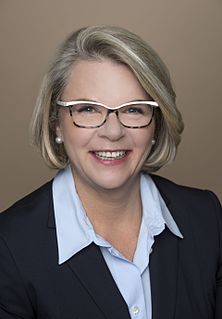A Quote by Mark Twain
Between us, we cover all knowledge; he knows all that can be known and I know the rest.
Related Quotes
As Indigenous peoples, we know there is more to the world. We know spirits exist. We know as women, because we're especially attuned to this kind of knowledge, that spirits exist and have a presence in our lives. Some of us are gifted and can communicate with the spirit world. Not everyone has that gift and can perceive the borders between the living and the dead and our society actively discourages us of exploring the knowledge of what many of us have already always known in our cultures.
The goal of mankind is knowledge ... Now this knowledge is inherent in man. No knowledge comes from outside: it is all inside. What we say a man 'knows', should, in strict psychological language, be what he 'discovers' or 'unveils'; what man 'learns' is really what he discovers by taking the cover off his own soul, which is a mine of infinite knowledge.
The word "knowledge" itself, we like to break it down into two different words, "know" and "ledge." You've got to know the ledge. Know the limitation of things. Know where they go, know where they start from. We say knowledge is the basic foundation of the universe. But everything is first based on something being known. Then, when it's known, then it can be manifested.
No scientist knows the world merely by holding it at arm's length: if we ever managed to build the objectivist wall between the knower and the known, we could know nothing except the wall itself. Science requires an engagement with the world, a live encounter between the knower and the known. That encounter has moments of distance, but it would not be an encounter without moments of intimacy as well. Knowing of any sort is relational, animated by a desire to come into deeper community with what we know.
The child is naturally meditative. He is a sort of samadhi; he's coming out of the womb of existence. His life river is yset absolutely fresh, just from the source. He knows the truth, but he does not know that he knows.... His knowledge is not yet aware. It is innocent. It is simply there, as a matter of fact. And he is not separate from his knowledge; he is his knowledge. He has not mind, he has simple being.
Despite popular theories, I believe people fall in love based not on good looks or fate but on knowledge. Either they are amazed by something a beloved knows that they themselves do not know; or they discover a common rare knowledge; or they can supply knowledge to someone who's lacking. Hasn't everyone found a strange ignorance in someone beguiling? . . .Nowadays, trendy librarians, wanting to be important, say, Knowledge is power. I know better. Knowledge is love.
To know how little one knows is to have genuine knowledge. Not to know how little one knows is to be deluded. Only those who know when they are deluded can free themselves from such delusion. The intelligent people are not deluded, because they know and accept their ignorance as ignorance, and thereby have genuine knowledge.
If He opens a door for you, thereby making Himself known, pay no heed if your do not measure up to this. For, in truth, He has not opened if for you but out of a desire to make Himself known to you. Do you not know that He is the one who presented the knowledge of Himself to you, whereas you are the one who presented Him with deeds? What a difference between what He brings to you and what you present to Him!
Knowledge signifies things known. Where there are no things known, there is no knowledge. Where there are no things to be known, there can be no knowledge. We have observed that every science, that is, every branch of knowledge, is compounded of certain facts, of which our sensations furnish the evidence. Where no such evidence is supplied, we are without data; we are without first premises; and when, without these, we attempt to build up a science, we do as those who raise edifices without foundations. And what do such builders construct? Castles in the air.





































